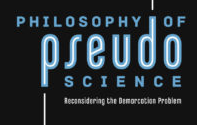
Climate change denial, intelligent design, creationism, and anti-vaccines hypotheses: are these scientific?
Most scientists would say that no, creationism is not a hypothesis or a theory with the same scientific dignity that evolutionary theory has (however we define the structure of this theory). In fact, many (perhaps creationist supporters as well) would say that creationism is just nonscience. However, in other cases (as intelligent design, climate change denial, or alternative medicine) the situation is rather different. Some authors tend to present certain theses as scientific, but others will say that even if they look scientific, they are not. This is the problem of pseudoscience.
This issue is usually understood in philosophical quarters as the demarcation problem. I have already talked about the problem of what characterizes science and scientific activity, especially in my previous posts on Thomas Huxley and The Empirical Stance. I have supported the idea that science is characterized more by an attitude and an ethos rather than a set of theories or specific methodologies. However, this thesis is problematic if considered in light of the science/pseudoscience problem. Supporters of climate change denial in principle seem to endorse the empirical stance I talked about, and hence they would count as scientific on this account. However, most scientists would say this is pseudoscience. So the problem remains: how do we identify pseudoscience?
There are exceptions. Massimo Pigliucci and Maarten Boudry edited a book, Philosophy of Pseudoscience: Reconsidering the Demarcation Problem, about this issue. They start from the recognition that even if attempts to demarcate science and pseudoscience failed, still “[p]hilosophers and scientists readily recognize a pseudoscience when they see one.” This book is a must for those who want to understand the roots of the problem (both philosophically and historically) and how the problem might be approached today in light of the way current scientific establishment is organized. The book consists of six parts. Chapters in the first part deal with the demarcation problem as an intellectual puzzle, trying to establish the way we should think about this problem. The second part is about the history of the problem and the social organization of contemporary pseudosciences. The third part is focused on borderline cases of science and pseudoscience.

While parts four and five focus on specific issues, such as science and the supernatural or the argumentative structure of pseudoscience, the final part is about the cognitive roots of pseudoscience. Contributors to this volume include, among the others, Massimo Pigliucci, Sven Ove Hansson, Thomas Nickles, Noretta Koertge, and Michael Ruse.
But why should we care about the problem in the first place?
Why is it so important to distinguish between science and pseudoscience, and why should we do this from philosophical, historical, and sociological points of view in particular? We want to understand what counts or not as science because of the ever-increasing impact of science in modern society. Climate change denial may have important consequences on the future of our children. The same applies for vaccinations and alternative medicine. Because of the consequences that accepting an enterprise as scientific or not may have in our lives, it is “of compelling interest to all of us to understand the nature of science” and of pseudoscience.
Originally published by at ctshf.nd.edu on October 18, 2017.